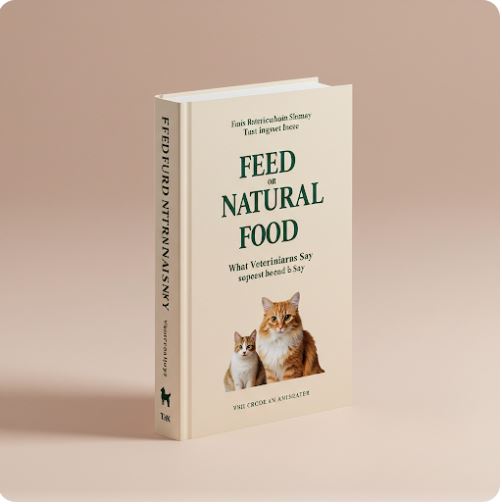Feed or Natural Food: What Veterinarians Say
Introduction to Pet Nutrition
"Feed or Natural Food: What Veterinarians Say" Explore the essential aspects of pet nutrition in this comprehensive guide. Understand the differences between commercial feeds and natural foods, learn about the nutritional requirements of different pets, and discover veterinarian insights on making informed dietary choices. Whether considering convenience or health benefits, this article emphasizes the importance of tailored nutrition aligned with each pet's unique needs. Gain valuable knowledge to help your furry companions thrive and live a healthy, happy life.
Understanding pet nutrition is crucial for ensuring the overall health and well-being of our companion animals. Just as in humans, the type and quality of food that pets consume directly affect their physical condition, energy levels, and longevity. Therefore, making informed dietary choices is essential for pet owners who wish to keep their animals healthy and thriving.
Pet food generally falls into two primary categories: commercial feeds and natural foods. Commercial feeds encompass various products manufactured specifically for pets by large companies. These products often contain a mix of ingredients designed to provide balanced nutrition, meeting the dietary requirements of different species and life stages. They are available in both dry kibble and wet canned forms, catering to diverse preferences of pets and their owners.
On the other hand, natural foods emphasize unprocessed ingredients that promote a whole-food diet. These meals typically include fresh meats, vegetables, and grains, aimed at closely mimicking the diets that animals would consume in the wild. Advocates for natural feeding believe it offers potential benefits, such as improved digestion and a lower likelihood of food-related allergies. Nonetheless, it is vital to ensure that natural diets are nutritionally complete to avoid deficiencies.
Given the complexities of pet nutrition, consulting with veterinarians is highly recommended. Veterinarians possess the expertise to guide pet owners in making dietary choices that align with their pets' individual health needs. They can provide insights on the pros and cons of both commercial feeds and natural foods, ensuring that owners understand how to meet their pets’ nutritional requirements adequately. Seeking professional advice can help pet owners strike the right balance for their beloved animals.
Understanding Commercial Pet Food
Commercial pet food is a category that encompasses a variety of products designed to meet the nutritional needs of pets. The most common types of commercial pet food include dry kibble, wet food, and specialized diets formulated for specific health conditions or life stages. Each type of commercial food possesses unique characteristics, which can significantly influence a pet's diet and overall health.
Dry kibble is known for its convenience and long shelf life, often making it the go-to option for many pet owners. It generally contains a combination of meat, grains, and vegetables, all processed to ensure a stable nutrient profile. Wet food, on the other hand, provides hydration and is often palatable, appealing to pets with dental issues or those that are picky eaters. Both types are designed to meet the minimum nutritional standards set by various regulatory bodies, such as the Association of American Feed Control Officials (AAFCO).
When evaluating commercial pet food, it is essential to understand the ingredients listed on the packaging. Common components include protein sources like chicken, beef, fish, and plant-based proteins, as well as carbohydrates such as corn, rice, or potatoes. Additionally, commercial pet foods may contain preservatives, vitamins, and minerals to enhance shelf life and nutritional value. Formulation is governed by strict regulations to ensure that they provide the necessary nutrients in appropriate ratios.
Feeding pets commercial food comes with its own set of advantages and challenges. The convenience and formulation reliability often allow pet owners to save time and ensure their pets receive a balanced diet. However, potential drawbacks may include the reliance on fillers and artificial additives in some products, which raises concerns among discerning pet owners. As a result, understanding the intricate details of commercial pet food can assist in making informed dietary choices for pets.
Exploring Natural Pet Food Options
Natural pet food refers to products that are made with ingredients sourced from nature without artificial additives, preservatives, or other synthetic components. This category has gained popularity among pet owners who seek diets that align with what they perceive to be more wholesome and beneficial for their pets. Generally, natural pet foods are composed of high-quality proteins, whole grains, and fresh fruits and vegetables, designed to provide optimal nutrition.
One significant aspect of natural pet food is the rise of raw diets. Advocates of this regimen argue that feeding pets raw meat, bones, and organ meats mimics a more ancestral diet, potentially leading to improved digestion, healthier coats, and enhanced energy levels. However, it is crucial for pet owners to be mindful of food safety, as raw diets come with risks related to bacterial contamination and improper nutritional balance.
Another option is homemade meals, crafted by pet owners themselves. This practice allows for complete control over the ingredients, ensuring that the meals are free from unwanted additives. However, creating a nutritionally balanced homemade diet requires careful planning and knowledge of animal dietary needs. Consulting with a veterinarian or a pet nutritionist can help in formulating appropriate meals that meet the pet's specific requirements.
Organic options also fall under the umbrella of natural pet food, incorporating ingredients that are grown without harmful pesticides or synthetic fertilizers. These products are often marketed as being healthier and more sustainable. Pet owners may gravitate towards such choices pathing towards eco-consciousness and a desire for high-quality nutrition. While these dietary options can offer benefits like freshness and better ingredient quality, there may be challenges in preparing these diets consistently to ensure a balanced nutrition profile for pets.
Veterinarian Insights on Feed vs. Natural Food
The debate surrounding feed versus natural food for pets is one that elicits passionate opinions from pet owners and professionals alike. Veterinarians play a crucial role in this discussion, offering evidence-based insights derived from scientific research and clinical experience. Many veterinarians recommend commercial pet food, primarily due to its consistent nutritional value and the careful formulation that meets the dietary needs of animals at various life stages. These commercial feeds undergo rigorous testing to ensure they provide a balance of proteins, fats, carbohydrates, vitamins, and minerals essential for optimal health.
One common reason veterinarians advocate for commercial pet food is the concern over nutrient deficiencies that can arise from unregulated homemade diets or the use of natural food. While proponents of natural diets often cite the benefits of fresh ingredients, many veterinarians emphasize that these diets can lack essential nutrients if not properly formulated. Additionally, they point out that certain ingredients, such as raw meats, can pose health risks to pets, including exposure to pathogens that could lead to serious illnesses.
Veterinarians also seek to dispel myths surrounding pet food types. One prevailing misconception is that all commercial feeds contain low-quality ingredients and are harmful to pets. In fact, veterinarians assert that reputable brands invest considerable resources in research and development to produce high-quality, nutritious options. It is essential for pet owners to choose brands validated by veterinary nutritionists and those that have undergone feeding trials. With the rise of premium and specialty pet foods, veterinarians acknowledge that there are satisfactory options that align with both pet health interests and owner preferences.
Ultimately, while the choice between feed and natural food may vary based on individual pet needs, veterinarians encourage a balanced approach, emphasizing the importance of consulting with a veterinarian to determine the best dietary strategy for any particular pet. Understanding these professional insights can greatly assist pet owners in making informed decisions regarding their pets' nutrition.
Evaluating Nutritional Needs of Pets
Understanding the nutritional needs of pets is essential for ensuring their overall health and well-being. These requirements can vary significantly based on several factors, including species, age, size, and health status. Recognizing these variations is crucial for pet owners who aim to provide an optimal diet, whether opting for commercial feeds or natural food options.
First, it is vital to assess the specific needs based on the pet's species. For example, dogs and cats have different dietary requirements; dogs are omnivores, whereas cats are obligate carnivores. This fundamental difference impacts the types of nutrients each species needs. Additionally, age plays a critical role in determining dietary requirements. Puppies and kittens typically require a higher caloric intake and specific nutrients for growth and development, while senior pets might need a diet low in calories but rich in fiber to maintain digestive health.
Size is another significant factor in evaluating nutritional needs. Larger breeds may require more energy-dense diets compared to smaller breeds, which may have slower metabolisms and different dietary restrictions. Furthermore, health status cannot be overlooked; pets with certain medical conditions may need specialized diets to manage their health better. For instance, dogs with kidney disease often require a diet lower in protein and phosphorus.
After evaluating these dimensions, it is critical to adopt tailored feeding strategies that align with each pet's unique nutritional profile. Commercial diets are formulated to meet specific needs, while natural food diets can offer fresh alternatives. However, it is important to ensure that natural foods are nutritionally balanced to avoid deficiencies. Consulting with a veterinarian can provide valuable insights into a pet’s specific dietary needs and help pet owners make informed decisions regarding their feeding strategy, resulting in optimal health and longevity for their pets.
Challenges of Feeding Natural Foods
Adopting a natural food diet for pets presents several challenges that pet owners must navigate to ensure their furry companions receive adequate nutrition. One of the primary concerns is the preparation time involved in creating balanced meals. Unlike pre-packaged pet food, which is ready to serve, natural diets typically require careful planning and cooking. Pet owners may need to allocate significant time to research recipes, prepare ingredients, and cook meals from scratch. This can be particularly demanding for those with busy schedules, making meal preparation a daunting task.
Additionally, the cost of natural foods can be considerably higher than conventional kibble or canned options. Quality ingredients often come at a premium, and the necessity of sourcing fresh produce and proteins can strain a pet owner’s budget. It's essential for owners to evaluate their financial resources before committing to a natural diet. While investing in high-quality natural food may benefit their pets in the long run, it’s crucial to find a balance that doesn’t compromise their financial stability.
Another challenge is ensuring that the diet is nutritionally balanced. Many pet owners might not be aware of the specific dietary needs of their pets, which can lead to deficiencies or excesses in essential nutrients. This challenge underlines the importance of consulting with a pet nutrition specialist who can tailor meal plans to meet the unique needs of each pet. These experts can provide guidance on ingredient selection and portion sizes, helping owners create well-balanced and nutritious meals.
Finally, ensuring food safety is paramount. Natural ingredients can spoil more quickly than processed alternatives, necessitating proper storage and handling practices. Pet owners should be educated on food safety protocols to minimize risks of contamination or spoilage. Utilizing meal preparation services that focus on natural diets may alleviate some of these challenges, providing pet owners with professionally prepared meals while ensuring their pets receive optimal nutrition.
Case Studies: Pets on Different Diets
Examining the nutritional effects of commercial pet feeds and natural diets on pets can offer valuable insights for pet owners. Various case studies illustrate how these two dietary approaches can impact the health and well-being of pets.
One notable case involved a Labrador Retriever named Max, who was exclusively fed a popular commercial dog food. Over two years, Max exhibited significantly improved energy levels and a shiny coat, which were positively noted by both his owner and the veterinarian. Regular check-ups indicated optimal weight and good dental health. The pet owner reported that Max thrived on the formulated nutrients provided by the commercial feed, which claimed to support overall health, including joints and digestion.
In contrast, Bella, a Beagle from another household, was fed a natural diet consisting of freshly cooked meats, vegetables, and grains. While Bella's owner believed she enjoyed better taste and freshness with this approach, they faced challenges in balancing her diet to ensure all required nutrients were included. Initially, Bella showed noticeable improvements in her coat and vitality, but over time, she began experiencing nutrient deficiencies, leading to complications that required veterinary intervention.
These contrasting cases highlight that while commercial pet feeds can provide a balanced approach to nutrition, natural diets may pose challenges if not managed carefully. Some pet owners have reported weight management issues when feeding their pets natural food, which may not have been formulated to meet specific dietary requirements. It's crucial for pet owners to consider the unique health needs of their pets alongside their dietary choices.
Ultimately, both cases underscore the importance of consulting with veterinarians to navigate dietary decisions. Tailoring a pet's diet—whether through commercial feeds or natural food—must be done with informed awareness of their health, lifestyle, and specific nutritional needs.
The Role of Owner Preferences and Lifestyle
When it comes to selecting the appropriate diet for pets, owner preferences significantly influence the decision-making process. Pet owners often navigate a complex landscape of options, factoring in their personal beliefs, lifestyle choices, and convenience as they determine the best food for their furry companions. The growing trend of pet humanization has encouraged many owners to prioritize their pets' dietary needs, mirroring their own food choices and ethical considerations.
For instance, some pet owners may lean towards natural foods, largely influenced by their own dietary habits or a desire for healthier living. These individuals often believe that a natural diet, which consists of minimally processed ingredients, is more aligned with their idea of wholesome nutrition. Such beliefs are frequently rooted in the perception that natural food enhances the overall well-being of pets, improves longevity, and reduces the risk of certain health issues.
On the other hand, some owners prioritize convenience, leading them to opt for commercial feeds. Busy lifestyles, characterized by tight schedules and limited time for meal preparation, encourage the swift and straightforward choices that commercial pet foods provide. The ease of accessibility to these products, often available in diverse formulations tailored to varying pet needs, makes them a practical option for time-strapped owners. Additionally, affordability can be a significant factor; many commercial feeds offer a budget-friendly solution compared to purchasing high-quality natural ingredients.
Availability of ingredients also plays a vital role in influencing food choices. In regions where natural or organic products are harder to find, pet owners may turn to conventional feeds by default. Similarly, seasonal variations can impact accessibility, further guiding pet owners towards what is readily available rather than what they might ideally prefer. Understanding the myriad of factors affecting owner preferences and decision-making processes is essential in evaluating the broader context of pet nutrition.
Conclusion: Making Informed Decisions
In evaluating the best dietary options for pets, it is essential to consider various factors that influence a pet's health and wellbeing. Veterinarians often emphasize the significance of tailored nutrition, as every animal has unique dietary needs based on factors such as age, breed, activity level, and pre-existing health conditions. As pet owners navigate the options between commercial feed and natural food, understanding these individual requirements is paramount.
Veterinary professionals recommend a balanced approach that incorporates high-quality ingredients, whether from prepared feed or homemade diets. The discussion on pet nutrition must also take into account the importance of sourcing ingredients, as well as ensuring that any natural food options meet nutritional guidelines established by veterinary associations. It is vital for pet owners to be informed about the benefits and potential drawbacks of each feeding strategy, allowing for well-rounded decisions that prioritise their pet's health.
Additionally, consulting with a veterinarian can provide valuable insights into the specific needs of an animal. Professionals can offer tailored advice that accounts for health history, allergies, and lifestyle factors, giving pet owners the support necessary to make informed choices. By placing emphasis on veterinary guidance and individual considerations, pet owners are better equipped to select the nutritional path that optimally aligns with their pet's health and behavioral requirements.
In conclusion, making informed decisions when it comes to pet nutrition involves a comprehensive evaluation of both feeding methods and their implications. By prioritizing the wellbeing of their animals, pet owners can choose between feed and natural food with confidence, ensuring that their pets receive the nutritional support they deserve for a happy, healthy life.
Loja de Livros
Ofertas | Para Você | Mais Vendidos | Lançamentos | Indicações | Kindle Unlimited | eBooks Kindle | Livros Usados | Audible





















